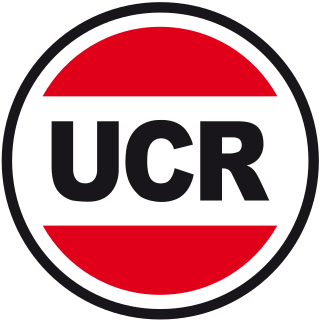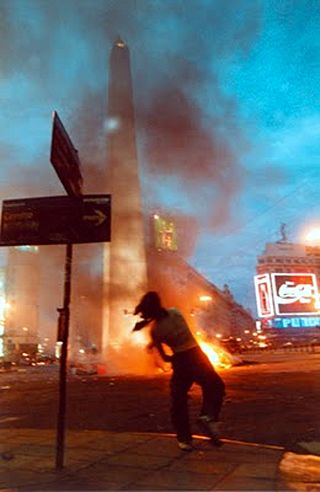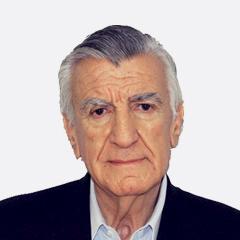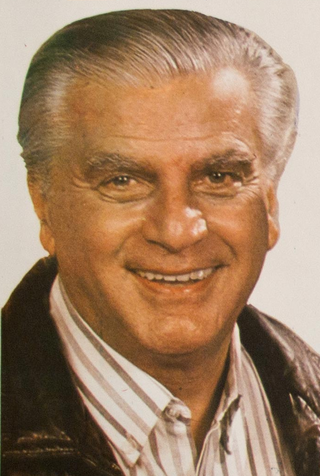The politics of Argentina take place in the framework of what the Constitution defines as a federal presidential representative democratic republic, where the President of Argentina is both Head of State and Head of Government. Legislative power is vested in the two chambers of the Argentine National Congress. The Judiciary is independent, as are the Executive and the Legislature. Elections take place regularly on a multi-party system.

Eduardo Alberto Duhalde is an Argentine former peronist politician who served as the interim President of Argentina from January 2002 to May 2003. He also served as Vice President and Governor of Buenos Aires in the 1990s.

Néstor Carlos Kirchner Ostoić was an Argentine lawyer and politician who served as the President of Argentina from 2003 to 2007. A member of the Justicialist Party, he previously served as Governor of Santa Cruz Province from 1991 to 2003, and mayor of Río Gallegos from 1987 to 1991. He later served as the first ever First Gentleman of Argentina during the first tenure of his wife, Cristina Fernández de Kirchner. By the time he died in October 2010, he was First Gentlemen from 2007, President of the Justicialist Party and National Deputy from 2009, and Secretary General of UNASUR from May 2010. Ideologically, he identified himself as a Peronist and a progressive, with his political approach called Kirchnerism.

Adolfo Rodríguez Saá is an Argentine Peronist politician. Born in a family that was highly influential in the history of the San Luis Province, he became the province's governor in 1983, after the end of the National Reorganization Process military dictatorship. He remained governor up to 2001, being re-elected in successive elections.

Fernando de la Rúa was an Argentine politician and a member of the Radical Civic Union (UCR) political party who served as President of Argentina from 10 December 1999 to 21 December 2001. De la Rúa was born in Córdoba; he entered politics after graduating with a degree in law. He was elected senator in 1973 and unsuccessfully ran for the office of Vice President as Ricardo Balbín's running mate the same year. He was re-elected senator in 1983 and 1993, and as deputy in 1991. He unsuccessfully opposed the pact of Olivos between President Carlos Menem and party leader Raúl Alfonsín, which enabled the 1994 amendment of the Argentine Constitution and the re-election of Menem in 1995.

Raúl Ricardo Alfonsín was an Argentine lawyer and statesman who served as President of Argentina from 10 December 1983 to 8 July 1989. He was the first democratically elected president after more than seven years of military dictatorship, and is considered the "father of modern democracy in Argentina". Ideologically, he identified as a radical and a social democrat, serving as the leader of the Radical Civic Union from 1983 to 1991, 1993 to 1995, 1999 to 2001, with his political approach being known as "Alfonsinism".

The Radical Civic Union is a centrist and liberal political party in Argentina. It has been ideologically heterogeneous, ranging from conservatism to social democracy, but since 1995 it has been a member of the Socialist International.

The December 2001 crisis, sometimes known as the Argentinazo, was a period of civil unrest and rioting in Argentina, which took place during December 2001, with the most violent incidents taking place on 19 and 20 December in the capital, Buenos Aires, Rosario and other large cities around the country. It was preceded by a popular revolt against the Argentine government, rallying behind the motto "All of them must go!", which caused the resignation of then-president Fernando de la Rúa, giving way to a period of political instability during which five government officials performed the duties of the Argentine presidency. This period of instability occurred during the larger period of crisis known as the Argentine great depression, an economic, political, and social crisis that lasted from 1998 until 2002.

Rosa Graciela Castagnola de Fernández Meijide, better known as Graciela Fernández Meijide, is an Argentine teacher, human rights activist and politician. She came to prominence by investigating the forced disappearances of thousands of people during the Dirty War. She later served as a deputy, senator, and government minister for the FrePaSo party.

José Luis Gioja is an Argentine Justicialist Party (PJ) politician, former governor of San Juan Province and former President of the Argentine Senate.

Jorge Alberto Obeid was an Argentine Justicialist Party (PJ) politician who was twice governor of Santa Fe Province and thrice a member of the Argentine Chamber of Deputies.

Álvaro Carlos Alsogaray was an Argentine politician and economist. He was Minister of Economy and was the principal proponent of classical liberalism in Argentina.
The Alliance for Work, Justice and Education, also known as Alliance was a political coalition in Argentina in the early 21st century. It was born from the alliance of the Radical Civic Union, the Front for a Country in Solidarity (FREPASO) and several smaller provincial parties in 1997. Initially center-left, before long conservative sectors took over the coalition. The Alliance disintegrated in the aftermath of the December 2001 riots, with its members returning to their former parties or finding new ones.

Antonio Francisco Cafiero was an Argentine Justicialist Party politician. Cafiero held a number of important posts throughout his career, including, most notably, the governorship of Buenos Aires Province from 1987 to 1991, the Cabinet Chief's Office under interim president Eduardo Camaño from 2001 to 2002, and a seat in the Senate of the Nation from 1993 to 2005.

Argentina held presidential elections on 24 October 1999. Legislative elections were held on four dates, 8 August, 12 September, 26 September and 24 October, though most polls took place on 24 October.

Eduardo Menem is an Argentine Justicialist Party politician. He is a former Senator and the brother of former President Carlos Menem.

Federal Peronism, also known as Dissident Peronism, is the faction or branch of either moderate, centrist or right-wing Peronism, that is currently identified mostly by its opposition to Kirchnerism, the left-wing faction of Peronism.

Francisco Javier García Cabeza de Vaca is a Mexican politician affiliated with the PAN, and the Governor of Tamaulipas from 2016 to 2022. García has previously served as a local and federal legislator, having served one term in the Chamber of Deputies and three and a half years in the Senate.

Eduardo Bauzá was an Argentine lawyer and politician who served as Minister of Health and Minister of the Interior during Carlos Menem's presidency and was later the first Chief of the Cabinet of Ministers. He was member of the Argentine Senate from 5 June 1996 to 10 December 1999.

Humberto Schiavoni is an Argentine lawyer and politician. He is National Senator for Misiones province and he leads Republican Proposal in the upper house of National Congress of Argentina.


















